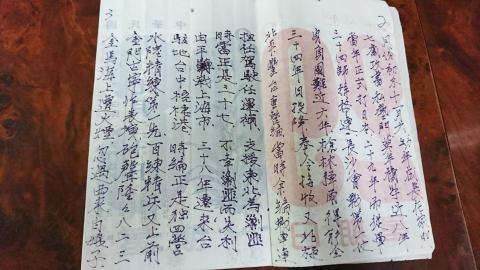The Hualien County Veterans Service Office said it plans to publish a collection of writings by 96-year-old Lee Chi-sen (李基森), who has been keeping a journal on the back of flimsy calendar sheets since his arrival in Taiwan from China 68 years ago.
Lee, born in China’s Sichuan Province, joined the Nationalist army at age 18. He was 28 when he arrived in Taiwan with the Chinese Nationalist Party (KMT) after its defeat in the Chinese Civil War in 1949.
He continued to serve in the military and was posted in Taichung and Kinmen before settling in Hualien’s Fengbin Township (豐濱) in 1994.

Photo: Courtesy of the Hualien County Veterans Service Office
“I have devoted my whole life to Taiwan, which is already my homeland,” said Lee, who considers himself “a true Taiwanese.”
Over the years, Lee cultivated a habit of collecting discarded calendar sheets and binding them with hemp string into small booklets, in which he has recorded by hand his recollections about war, travel and daily life.
During a regular visit last month, the center’s social workers found his work, the penmanship of which they described as “amazingly neat.”
Lee married a Chinese woman, but they filed for divorce years ago and their divorce lawsuit is still pending, social worker Kuo Hsu-fen (郭旭芬) said.
Lee practices calligraphy every day and has produced dozens of autobiographies, war memoirs and travel journals in the booklets made of calendar sheets, Kuo said.
“I am old and cannot remember things, so I have to write them down to avoid oblivion,” she quoted him as saying.
The office is to organize Lee’s writings and publish them soon, Kuo said.
There are about 8,000 registered veterans in Hualien, and the office’s social workers make regular visits to the homes of those in more remote townships such as Fengbin, Yuli (玉里), Fuli (富里) and Jhuosi (卓溪), Kuo said, adding that older veterans with special needs receive visits every three days.

The Ministry of Education (MOE) is to launch a new program to encourage international students to stay in Taiwan and explore job opportunities here after graduation, Deputy Minister of Education Yeh Ping-cheng (葉丙成) said on Friday. The government would provide full scholarships for international students to further their studies for two years in Taiwan, so those who want to pursue a master’s degree can consider applying for the program, he said. The fields included are science, technology, engineering, mathematics, semiconductors and finance, Yeh added. The program, called “Intense 2+2,” would also assist international students who completed the two years of further studies in

Former president Tsai Ing-wen (蔡英文) departed for Europe on Friday night, with planned stops in Lithuania and Denmark. Tsai arrived at Taiwan Taoyuan International Airport on Friday night, but did not speak to reporters before departing. Tsai wrote on social media later that the purpose of the trip was to reaffirm the commitment of Taiwanese to working with democratic allies to promote regional security and stability, upholding freedom and democracy, and defending their homeland. She also expressed hope that through joint efforts, Taiwan and Europe would continue to be partners building up economic resilience on the global stage. The former president was to first

Taiwan will now have four additional national holidays after the Legislative Yuan passed an amendment today, which also made Labor Day a national holiday for all sectors. The Chinese Nationalist Party (KMT) and Taiwan People’s Party (TPP) used their majority in the Legislative Yuan to pass the amendment to the Act on Implementing Memorial Days and State Holidays (紀念日及節日實施辦法), which the parties jointly proposed, in its third and final reading today. The legislature passed the bill to amend the act, which is currently enforced administratively, raising it to the legal level. The new legislation recognizes Confucius’ birthday on Sept. 28, the

The Taipei District Court sentenced babysitters Liu Tsai-hsuan (劉彩萱) and Liu Jou-lin (劉若琳) to life and 18 years in prison respectively today for causing the death of a one-year-old boy in December 2023. The Taipei District Prosecutors’ Office said that Liu Tsai-hsuan was entrusted with the care of a one-year-old boy, nicknamed Kai Kai (剴剴), in August 2023 by the Child Welfare League Foundation. From Sept. 1 to Dec. 23 that year, she and her sister Liu Jou-lin allegedly committed acts of abuse against the boy, who was rushed to the hospital with severe injuries on Dec. 24, 2023, but did not